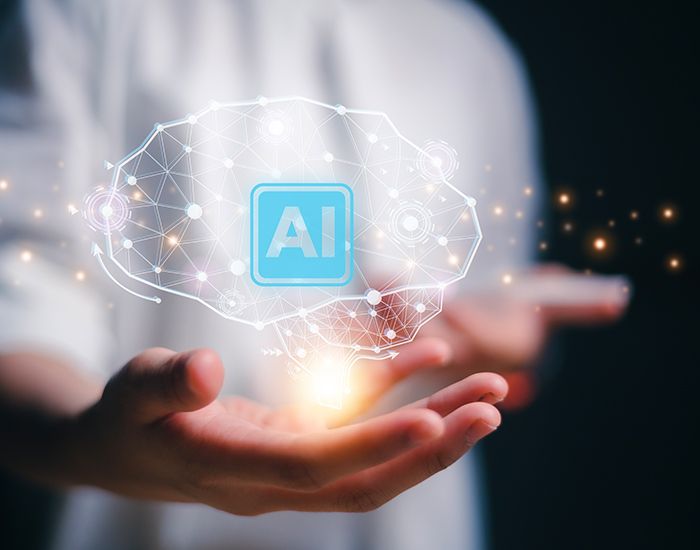NetSkill Wins Google For Startups Grant Of $350k!
Learn More >Discover how Gen-AI is transforming HR
Register for free webinarArtificial intelligence (AI) has altered many industries in the quickly developing digital world and it has had a significant impact on the sector of hiring and recruitment. . New chances for job seekers are being created by revolutionizing conventional techniques of finding and securing employment. This blog will examine how AI might revolutionize the hiring process and how it helps job seekers by increasing efficiency, promoting objectivity in decision-making, improving applicant matching, and providing tailored career advice.
The use of AI for screening resumes
Traditionally, shortlisting applicants required recruiters to spend a significant amount of time manually reading resumes. Applicant Tracking Systems (ATS) with AI capabilities have transformed this procedure. These systems swiftly scan and evaluate resumes using natural language processing (NLP) algorithms. They assist recruiters to quickly identify the best candidates by identifying pertinent keywords, work experience, education, and abilities. To improve their chances of passing the initial AI screening, job seekers could modify their resumes to match the keywords in the job description.
GoodWorks ATS is a robust and intelligent ATS platform that offers a personalized experience throughout the recruitment process. It facilitates job marketing through multiple channels, employs AI-ranking for candidate screening, and ensures seamless tracking from application to onboarding. The platform’s AI algorithms enable candidate nurturing via messages and emails, while its end-to-end intelligence streamlines recruitment, enhancing productivity, onboarding, and return on investment for Talent Acquisition teams.
Enhanced candidate sourcing
Using AI-powered tools, enhanced candidate sourcing goes beyond conventional techniques to find new individuals. AI can search through huge databases, professional networks and social media platforms to find people who possess particular skills and qualifications that are required for particular jobs. Employers can access a more varied talent pool and find applicants who might not have applied through traditional methods thanks to this wider reach. By keeping an up-to-date and thorough online presence on websites like LinkedIn and exhibiting their pertinent abilities and experiences, job seekers can boost their exposure to recruiters and AI-driven candidate sourcing tools.
AI powered assessments
AI-powered assessments use complex algorithms that analyze a candidates’ qualifications and skill set for a particular job position. A real-time analysis of candidates’ responses and behaviors are possible with these tests, giving employers useful information. Employers can make educated hiring decisions based on merit rather than preconceived notions with the aid of AI-driven assessment tools, which provide a more objective and effective review process. Job seekers should be ready for AI-driven evaluations to be used during the recruiting process and should practice taking online tests to become accustomed to the format and make sure they appropriately represent their skills to prospective employers.
Goodworks TestRocket offers an AI-powered assessment platform to efficiently screen, assess, interview, and enhance developers and potential employees. With 50+ skill assessments and a library of industry-proven tests, recruiters can precisely evaluate candidates. The platform supports hackathons, coding challenges, AI-generated candidate leaderboards, and data-driven insights, enabling informed decisions based on skills, experience, and fit.
Chatbots for candidate interactions
Artificial intelligence-powered chatbots are virtual assistants used in the employment process to connect with candidates. These chatbots interact with job seekers, responding to their inquiries, sharing details about the business and the recruiting procedure and even conducting preliminary interviews. Employers can speed up the hiring process, respond quickly to candidate questions and improve the candidate’s experience by utilizing chatbots. In order to make the hiring process more effective and candidate-friendly, job seekers should get used to this new style of communication and embrace the comfort of dealing with chatbots during the application and interview stages.
Video interviews and facial recognition
When conducting remote interviews, video interviews with facial recognition use AI to analyze candidates’ non-verbal cues, facial expressions and voice tones. Employers may assess a candidates’ communication abilities and psychological attributes outside of their vocal responses thanks to these AI-driven technologies, which give them useful insights. To make a good impression during video interviews, job candidates should pay attention to their nonverbal cues. In order to increase their chances of being hired, candidates should emphasize on professional body language, maintaining eye contact with the camera and showing confidence.

Unbiased hiring decisions
Unbiased hiring decisions are facilitated by AI-driven algorithms that only consider a candidate’s qualifications and skills, excluding demographic information from the evaluation process. AI supports unbiased and fair applicant evaluation by removing human biases like gender, race, or ethnicity. This strategy guarantees that all applicants are judged on their merits, fostering a more welcoming and diverse work environment. Unbiased hiring decisions benefit job seekers because they create equal chances and a level playing field by allowing their skills and talents to be the only criteria taken into account when making a hiring decision, regardless of their personal traits.
Personalized job recommendations
AI examines a job seeker’s abilities, employment background and preferences to provide specialized career recommendations. This data is then used by AI-driven job search sites to match people with positions that fit their interests and career aspirations. By saving time and effort and ensuring that candidates are presented with appropriate job opportunities that fit their particular profiles, this tailored approach improves the job-seeking process. Job seekers should make use of these AI-powered platforms to learn about fresh and interesting career opportunities, which will improve their chances of landing the perfect job that matches their skills and career goals.
Skill assessment and training
Job searchers can examine their abilities and find opportunities for growth with the help of AI-powered training and assessment tools. These platforms assess candidates’ skills using AI algorithms and offer insightful commentary. Job seekers can concentrate on upskilling in fields that are in demand and pertinent to their desired employment by using customized training recommendations. With the help of an AI-driven methodology, candidates can improve their skill sets, making them more marketable and improving their chances of landing their dream jobs. The confidence and readiness of job searchers for the hiring process can be considerably increased by embracing these AI-powered assessment and training opportunities.
Automated interview scheduling
AI is used in automated interview scheduling to speed up communication between interviewers and candidates. Artificial intelligence (AI)-driven tools can effectively manage schedules, availability, and time zones to locate mutually convenient interview times. Both parties save time because there is no longer a need for manual back and forth communication. This automated procedure benefits job seekers by ensuring a smoother and more effective scheduling experience and lowering the likelihood of scheduling conflicts. Employers may create a more applicant-friendly hiring process, improve the candidate experience overall and increase their chances of attracting top talent by implementing AI-powered interview scheduling.
Ethical Concerns and Data Privacy
AI-driven hiring strategies raise issues related to privacy and ethics. Massive volumes of candidate data are collected and analyzed by AI systems, which raises concerns about how this data is utilized, stored and shared. To protect candidates’ personal information, employers must place a high priority on data security and transparency. Fairness, eliminating bias and equal opportunities in the recruiting process are all ethical factors. It’s critical to strike a balance between utilizing AI’s advantages and protecting candidates’ rights. To be a part of a reliable and moral AI-powered hiring environment, employers should follow ethical standards and job searchers should be aware of their data rights.
In conclusion, AI has brought in a new era of hiring and fundamentally altered how candidates engage with the hiring process. While AI has benefits like improved resume screening, improved applicant sourcing, unbiased decision-making and personalized job suggestions, job searchers must get used to AI-driven evaluations, chatbots and video interviews . Job seekers can use AI-driven technologies to improve their job search techniques, upskill in pertinent fields, and maintain a strong online presence if they want to thrive in this new era of hiring. To safeguard candidates’ rights and guarantee a fair and equal recruiting process for all, it’s also important to be aware about data privacy and ethical issues in AI-driven hiring.
NetSkill Enterprise Learning Ecosystem (LMS, LXP, Frontline Training, and Corporate Training) is the state-of-the-art talent upskilling & frontline training solution for SMEs to Fortune 500 companies.












